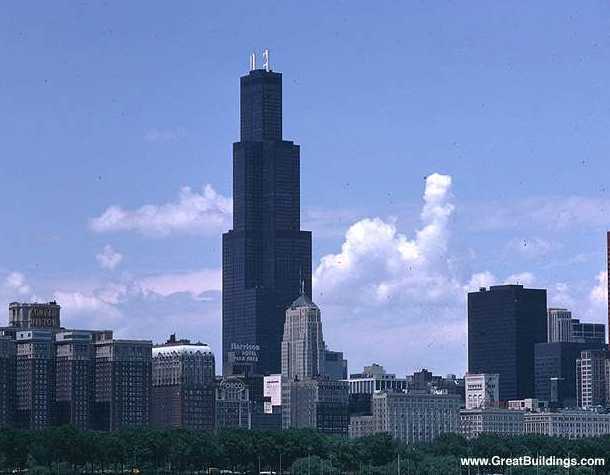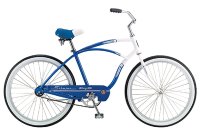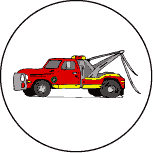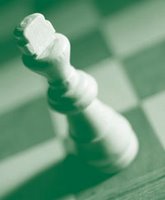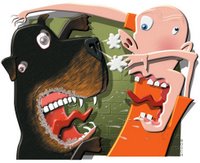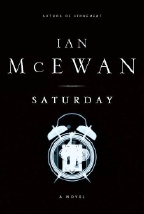 The more I think about this book the lower it goes on the rankings. Look for it tomorrow and you may not find it here. Some awesome writing takes place here though and it's a post 9/11 book that doesn't scream "look at me, look how creative I can be about the terrorist attacks, look how I'm dealing with it!" Example: as the main character sees a plane out of his window he remarks, "there gathered round the innocent silhouette of any plane a novel association. Everyone agrees, airliners look different in the sky these days..." And even though the book takes place on the day of an anti-war rally it's not overtly political - in fact, it is more a wonderful meditation on individuals and culture, connection and disconnection, and the arbitrariness of fate and violence on both a national and personal scale. On second thought, maybe it should move up the charts...
The more I think about this book the lower it goes on the rankings. Look for it tomorrow and you may not find it here. Some awesome writing takes place here though and it's a post 9/11 book that doesn't scream "look at me, look how creative I can be about the terrorist attacks, look how I'm dealing with it!" Example: as the main character sees a plane out of his window he remarks, "there gathered round the innocent silhouette of any plane a novel association. Everyone agrees, airliners look different in the sky these days..." And even though the book takes place on the day of an anti-war rally it's not overtly political - in fact, it is more a wonderful meditation on individuals and culture, connection and disconnection, and the arbitrariness of fate and violence on both a national and personal scale. On second thought, maybe it should move up the charts...4. Ilf and Petrov's American Road Trip - Ilya Ilf and Evgeny Petrov
 The last book that I read in 2006 ended up being one of the best. It was a total impulse buy from Cabinet magazine. Basically, these two Russian photo-journalists come to the United States in the 1930's to try to find the real "America." They buy a car in New York and drive out to San Francisco then head back through the South. The pictures (he used a Leica) are so artless that they are awesome; just snapshots really, and the commentary is priceless and spot-on, innocently charming but fool of satirical snootiness. They seem particularly obsessed with American advertising (refreshing Coca-Cola, burma shave signs, political posters). "We withstood it for a month. We didn't drink Coca-Cola. But then advertising got to us. We experienced the drink. Yes, Coca-Cola does refresh the throat, stimulate the nerves, and has a salutary effect on a weakened constitution. How could we not say that, when for three months it's been drilled into our skulls every day, every hour, and every minute?" So how did they find America? "The most advanced technology in the world and a horrifyingly oppressive, stupefying social order." I wish I could buy you a copy.
The last book that I read in 2006 ended up being one of the best. It was a total impulse buy from Cabinet magazine. Basically, these two Russian photo-journalists come to the United States in the 1930's to try to find the real "America." They buy a car in New York and drive out to San Francisco then head back through the South. The pictures (he used a Leica) are so artless that they are awesome; just snapshots really, and the commentary is priceless and spot-on, innocently charming but fool of satirical snootiness. They seem particularly obsessed with American advertising (refreshing Coca-Cola, burma shave signs, political posters). "We withstood it for a month. We didn't drink Coca-Cola. But then advertising got to us. We experienced the drink. Yes, Coca-Cola does refresh the throat, stimulate the nerves, and has a salutary effect on a weakened constitution. How could we not say that, when for three months it's been drilled into our skulls every day, every hour, and every minute?" So how did they find America? "The most advanced technology in the world and a horrifyingly oppressive, stupefying social order." I wish I could buy you a copy.3. The Path Between the Seas - David McCullough
 Can anything be more impressive than the engineering of the Panama Canal? The Panama canal was an essential part of American empire-building and I expected to hear about that as I read this book, however, the focus here is a tale of disease and hardship was. The sheer mechanics of building this project were amazing. The construction and political decisions will make the reader cringe at times. It would be easy to attribute the ultimate success to superior American ingenuity and resolve, however, while this did indeed play a part, the impact of a national, government financed effort (as opposed to the privately financed French effort) coupled with huge strides in medical and mechanical technology in the intervening years probably was the most compelling reason for American success. Get this: when work was at its height, the US was excavating at Panama the equivalent of a Suez Canal every three year. However, one of the least impressive things about the big dig was the understanding of disease. To protect themselves from the ants attacking, family put everything (plants, bed posts, food) inside of bowls of water which in effect were breeding grounds for mosquitos and yellow fever.
Can anything be more impressive than the engineering of the Panama Canal? The Panama canal was an essential part of American empire-building and I expected to hear about that as I read this book, however, the focus here is a tale of disease and hardship was. The sheer mechanics of building this project were amazing. The construction and political decisions will make the reader cringe at times. It would be easy to attribute the ultimate success to superior American ingenuity and resolve, however, while this did indeed play a part, the impact of a national, government financed effort (as opposed to the privately financed French effort) coupled with huge strides in medical and mechanical technology in the intervening years probably was the most compelling reason for American success. Get this: when work was at its height, the US was excavating at Panama the equivalent of a Suez Canal every three year. However, one of the least impressive things about the big dig was the understanding of disease. To protect themselves from the ants attacking, family put everything (plants, bed posts, food) inside of bowls of water which in effect were breeding grounds for mosquitos and yellow fever.2. Bering - Orcutt Frost
 When I worked at the Barnes years ago people used to recommend books to me all the time - "You just have to read the Purpose Driven Life; the DaVinci Code is to die for; have you heard of the new Patterson?" I, of course, never listened - good for them that they like trash fiction and that they are at least reading. Anyway, this is one book that I actually listened to a customer on and it was incredible. I read it in February and it still has the sticking power to be the top non-fiction book that I read this year. You can read about Bering in this previous post; however, this fact is something that seems awesome. Scurvy is among the most easily cured of all diseases known, yet from the 15th to the 20th centuries more human beings dies from scurvy that from any other disease. For as incredible and imposing a figure Bering is in this book, the doctor, Steller, ends up being the true protagonist by administering to the crew's ailments and helping to improve their spirits until they can make it home.
When I worked at the Barnes years ago people used to recommend books to me all the time - "You just have to read the Purpose Driven Life; the DaVinci Code is to die for; have you heard of the new Patterson?" I, of course, never listened - good for them that they like trash fiction and that they are at least reading. Anyway, this is one book that I actually listened to a customer on and it was incredible. I read it in February and it still has the sticking power to be the top non-fiction book that I read this year. You can read about Bering in this previous post; however, this fact is something that seems awesome. Scurvy is among the most easily cured of all diseases known, yet from the 15th to the 20th centuries more human beings dies from scurvy that from any other disease. For as incredible and imposing a figure Bering is in this book, the doctor, Steller, ends up being the true protagonist by administering to the crew's ailments and helping to improve their spirits until they can make it home.1. The Road - Cormac McCarthy
 This book easily won the "Booty" for best book of the year, it seems to be making it into a lot of top ten lists this year. To be honest, I was at first a little skeptical about this book. The whole premise, a man and boy walk across the land after the apocalypse, seems a little too Beckett-esque to be any good. Plus McCarthy just came out with a book in 2005, so another book in less than a year seemed a little Stephen Kingy. However, it is a true masterpiece in subtle characterization. It has one of those perfect endings: one that at first leaves you feeling a little cheated but then when you stop to think about it, and it makes perfect sense (a la 1984).
This book easily won the "Booty" for best book of the year, it seems to be making it into a lot of top ten lists this year. To be honest, I was at first a little skeptical about this book. The whole premise, a man and boy walk across the land after the apocalypse, seems a little too Beckett-esque to be any good. Plus McCarthy just came out with a book in 2005, so another book in less than a year seemed a little Stephen Kingy. However, it is a true masterpiece in subtle characterization. It has one of those perfect endings: one that at first leaves you feeling a little cheated but then when you stop to think about it, and it makes perfect sense (a la 1984).Well, there you have it.
My top 10 books of 2006; 5 non-fiction, 4 fiction, and 1 lit crit ... Stay tuned for honorable mentions...






